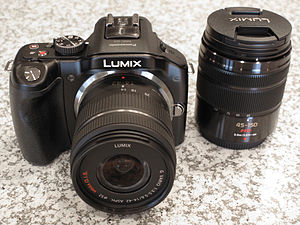Panasonic Lumix DMC-G5
This article contains promotional content. (October 2012) |
 Panasonic DMC-G5, with 14-42mm and 45-150mm lenses | |
| Overview | |
|---|---|
| Type | Micro Four Thirds System |
| Lens | |
| Lens | Micro Four Thirds System mount |
| Sensor/medium | |
| Sensor | 17.3 × 13.0 mm Live MOS |
| Maximum resolution | 4592 x 3448 (16.7 megapixels, 16.0 mp effective) 4:3 native; 3:2, 16:9, 1:1 image format(cropped from 4:3 native image format) |
| Film speed | ISO 160–12800 |
| Focusing | |
| Focus modes | Automatic or Manual |
| Exposure/metering | |
| Exposure modes | Manual, Program, Automatic, Shutter Priority, Aperture Priority |
| Exposure metering | Intelligent Multiple (Center weighted, average and spot) |
| Shutter | |
| Shutter | focal-plane |
| Shutter speed range | 60–1/4000 sec |
| General | |
| Weight | 346g |
The Panasonic Lumix DMC-G5 is a digital mirrorless interchangeable lens camera that adheres to the joint Olympus and Panasonic Micro Four Thirds System (MFT system) design standard.[1] It is identified as the twelfth Panasonic MFT camera introduced under the standard and the nineteenth model MFT camera introduced by either Olympus or Panasonic.
The G5 includes HD video recording capability in AVCHD format. The G5 is the successor to the Panasonic Lumix DMC-G3 and is Panasonic's most junior MFT camera.
The G5 differs from the G3 principally by offering a higher maximum ISO (12,800 vs 6,400), a continuous shooting frame rate (6 vs 4 fps), a higher resolution screen, and a new image sensor and processor.
Physically, the G5 is very similar to the Panasonic Lumix DMC-G3, but it has a larger hand grip. However, most of the camera's functionality is also accessible through the touch-control LCD panel.
References
[edit]- ^ "Micro Four Thirds | Benefits of Micro". Four Thirds. Retrieved 2012-02-10.
External links
[edit]- Panasonic Lumix DMC-G5 Product Page
- Panasonic Lumix G5 preview at cameralabs.com
- Panasonic Lumix DMC-G5 Preview – dpreview.com
- Panasonic Lumix G5 Review at photographyblog.com
- Panasonic Lumix G5 review at pocket-lint.com
